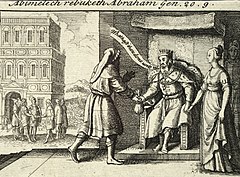Abimelech

Abimelech (also spelled Abimelek or Avimelech; Hebrew: אֲבִימֶלֶךְ / אֲבִימָלֶךְ, Modern Aviméleḵ / Avimáleḵ Tiberian ʼAḇîméleḵ / ʼAḇîmāleḵ, "father/leader of a king; my father/leader, a king") was the name of multiple Philistine kings mentioned in the Hebrew Bible.
Etymology[]
The name or title Abimelech is formed from Hebrew words for "father" and "king," and may be interpreted in a variety of ways, including "Father-King", "My father is king," or "Father of a king."[1] In the Pentateuch, it is used as a title for kings in the land of Canaan.[2]
At the time of the Amarna tablets (mid-14th century BC), there was an Egyptian governor of Tyre similarly named Abimilki, who is sometimes speculated to be connected with one or more of the biblical Abimelechs.
Abimelech of Gerar[]
Abimelech was most prominently the name of a polytheistic[3][4] king of Gerar who is mentioned in two of the three wife-sister narratives in Genesis, in connection with both Abraham[5] and Isaac.[6]
King Abimelech of Gerar also appears in an extra-biblical tradition recounted in texts such as the Kitab al-Magall, the Cave of Treasures and the Conflict of Adam and Eve with Satan, as one of 12 regional kings in Abraham's time said to have built the city of Jerusalem for Melchizedek.
Other people with this name[]
Apart from the king (or kings) of Gerar, the Bible also records this name for:
- Abimelech, son of Gideon,[7] proclaimed king after the death of his father.[8]
- The father of Abiathar, and high priest in the time of David.[9] In the parallel passage,[10] the name is given as Ahimelech; most authorities consider this the more correct reading.
- The king of Gath better known as Achish, referred to as Abimelech or Achimelech in the title of Psalm 34.[11]
- The husband of Naomi, and father of Mahlon and Chilion who leaves Bethlehem and dies in the land of Moab,[12] in the Hebrew, his name is given as , which is likely the correct reading.
Other literary references include:
- Abimélech, Satrap of Gaza is a character baritone in Saint-Saëns' Samson and Delilah.[13]
See also[]
References[]
| Wikimedia Commons has media related to Abimelech. |
- ^ Wolfgang Bluedorn (19 December 2001). Yahweh Versus Baalism: A Theological Reading of the Gideon-Abimelech Narrative. A&C Black. p. 192. ISBN 978-1-84127-200-9.
- ^ Wolfgang Bluedorn (19 December 2001). Yahweh Versus Baalism: A Theological Reading of the Gideon-Abimelech Narrative. A&C Black. p. 191. ISBN 978-1-84127-200-9.
- ^ Benamozegh, Elia; Maxwell Luria (1995). Israel and Humanity. Paulist Press International. p. 104. ISBN 978-0809135417.
- ^ Hamilton, Victor P. (2012). Exodus: An Exegetical Commentary. Baker Academic. ISBN 978-0801031830.
- ^ Genesis chap. 20
- ^ Genesis chap. 26
- ^ Judges 8:31
- ^ Judges 9:1–6
- ^ 1 Chronicles 18:16
- ^ 2 Samuel 8:17
- ^ Psalm 34
- ^ Ruth 1:2–3
- ^ Weimar, 1877
![]() This article incorporates text from a publication now in the public domain: Easton, Matthew George (1897). Easton's Bible Dictionary (New and revised ed.). T. Nelson and Sons. Missing or empty
This article incorporates text from a publication now in the public domain: Easton, Matthew George (1897). Easton's Bible Dictionary (New and revised ed.). T. Nelson and Sons. Missing or empty |title= (help)
- Philistines
- Torah monarchs
- Hebrew Bible people
- Bible-related lists of people
- Vayeira

